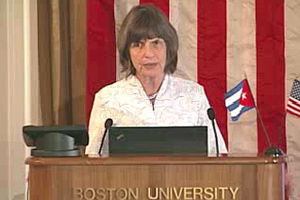After the Revolution
Daryl DeLuca, assistant dean of students, and Susan Eckstein, CAS professor of sociology and international relations, talk about Cuba on BUniverse

Click here to watch Daryl DeLuca and Susan Eckstein on BUniverse.
Ninety miles from the United States, Cubahas at times preoccupied every American president since Eisenhower.“The Cuban Revolution at 50” is discussed from two differentperspectives. First, it’s explored through the camera lens andhumanitarian work of Daryl DeLuca, assistant dean of students; then Susan Eckstein,CAS professor of sociology and international relations, discusses wherethe tempestuous U.S.-Cuban relationship might be headed in the Obamaadministration.
DeLuca gives a presentation showing photographs from his 16 trips toCuba over the past 10 years. He has been pursuing his interests inhumanitarian, educational, and religious work in Cuba. In 2003 and2004, he led groups of BU students on an eight-day Alternative Spring Break trip to the country, providing medical supplies and clothing.
“I often get asked three questions. One is, ‘How did I first becomeinvolved in Cuba?’ Second, ‘What is it like being in Cuba?’ And third,and most important for many people, ‘How can I go?’”
Eckstein takes the historical and policy context of the CubanRevolution, of Fidel Castro’s overthrow of Batista’s dictatorship, andweaves it into the current time frame. She also looks at how the UnitedStates initially supported the revolution, until Castro announced hisallegiance to Communism.
About the speakers:
Daryl DeLuca, assistant dean of students, received his bachelor’sdegree in administration from Bentley College, and his master’s inhigher education administration from the University of Pittsburgh. In2007, he received the Boston University Honorary Scarlet Key award, andcurrently works with the Dean of Students, where he’s worked for the past 30 years.
Susan Eckstein,professor of sociology and international relations, is a specialist onurbanization, immigration, poverty, rights and injustices, and socialmovements in the context of Third World Countries. She is most recentlythe author of Back from the Future: Cuba Under Castro, Struggles for Social Justice in Latin America (co-editor), as well as Spanish-language books, including El Estado y la Pobreza Urbana en Mexico.She has held grants and fellowships from the John D. and Catherine T.MacArthur Foundation, Radcliffe Institute, American Council of LearnedSocieties, Social Science Research Council, Rockefeller Foundation,Institute for World Order, Ford Foundation, and the Tinker Foundation.She has served as President of the Latin American Studies Associationand of the New England Council on Latin America.
Comments & Discussion
Boston University moderates comments to facilitate an informed, substantive, civil conversation. Abusive, profane, self-promotional, misleading, incoherent or off-topic comments will be rejected. Moderators are staffed during regular business hours (EST) and can only accept comments written in English. Statistics or facts must include a citation or a link to the citation.